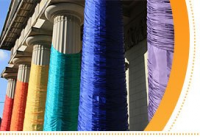Difference between revisions of "LGBTQ Philosophers and Teachers of Philosophy"
| Line 1: | Line 1: | ||
| − | [[File:lgbtphilosophy.png|200px|thumb|left]] | + | [[File:lgbtphilosophy.png|200px|thumb|left]] |
| + | |||
| + | Philosophy is the study of human existence, its reality, and how individuals and society interact and organize themselves. The practice has been around, formally and informally, since the beginning of time since humans have always had the capacity to contemplate their existence in their wider world. | ||
| + | |||
| + | Because philosophy encompasses the realms of the political and the religious, there have been many times that LGBTQ philosophers and their writings have clashed with persons of authority in these areas. For example, Italian LGBTQ philosopher [[Tommaso Campanella]] spent 27 years in a Spanish jail where he wrote his greatest works. | ||
'''Austria''' | '''Austria''' | ||
Revision as of 12:31, 2 May 2021
Philosophy is the study of human existence, its reality, and how individuals and society interact and organize themselves. The practice has been around, formally and informally, since the beginning of time since humans have always had the capacity to contemplate their existence in their wider world.
Because philosophy encompasses the realms of the political and the religious, there have been many times that LGBTQ philosophers and their writings have clashed with persons of authority in these areas. For example, Italian LGBTQ philosopher Tommaso Campanella spent 27 years in a Spanish jail where he wrote his greatest works.
Austria
Brazil
Canada
Finland
France
- Jean-Paul Aron
- Roland Barthes
- Simone de Beauvoir
- Tony Duvert
- Didier Eribon
- Michel Foucault
- Guy Hocquenghem
- Michel de Montaigne
- Paul B. Preciado
- Donatien Alphonse, Marquis de Sade
- Francois Wahl
Germany
Ghana
Great Britain
Italy
Ivory Coast
Rome
Spain
Sweden
Syria
United States
See Also

